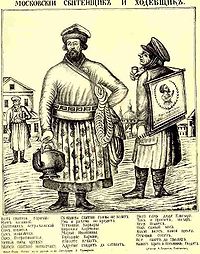
Sbitenshchik
Encyclopedia

Sbiten
Sbiten, also sbiten' is a hot winter Russian traditional drink.- History :First mentioned in Slavonic chronicles in 1128, it remained popular with all strata of Russian society until the 19th century when it was replaced by coffee and tea...
vendor (sbiten – a hot winter Russian traditional drink) in old Russia. The tradition began in 12th century.
The comic opera
Comic opera
Comic opera denotes a sung dramatic work of a light or comic nature, usually with a happy ending.Forms of comic opera first developed in late 17th-century Italy. By the 1730s, a new operatic genre, opera buffa, emerged as an alternative to opera seria...
The Sbiten Vendor (Сбитенщик – Sbitenshchik) by Yakov Knyazhnin
Yakov Knyazhnin
Yakov Borisovich Knyazhnin was Russia's foremost tragic author during the reign of Catherine the Great. Knyazhnin's contemporaries hailed him as the true successor to his father-in-law Alexander Sumarokov, but posterity, in the words of Vladimir Nabokov, tended to view his tragedies and comedies...
with music by Czech composer Antoine Bullant, 1783, was very popular in 18-19th centuries in Russia
Russia
Russia or , officially known as both Russia and the Russian Federation , is a country in northern Eurasia. It is a federal semi-presidential republic, comprising 83 federal subjects...
.
Quotations
“On the lower floor there were shops with horse-collars, ropes, and cracknels, etc., and in the corner shop, or rather at its window, sat a sbiten seller, with a samovar of red copper, and a face as red as his samovar.” (Gogol, “Dead SoulsDead Souls
Dead Souls is a novel by Nikolai Gogol, first published in 1842, and widely regarded as an exemplar of 19th-century Russian literature. Gogol himself saw it as an "epic poem in prose", and within the book as a "novel in verse". Despite supposedly completing the trilogy's second part, Gogol...
”, 1837-1838, Chapter I)

